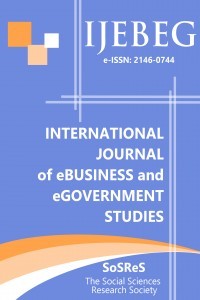EVALUATING THE COST-BENEFITS OF E-GOVERNMENT PROJECTS: Rationale for Going beyond Objective Financial Measures
EVALUATING THE COST-BENEFITS OF E-GOVERNMENT PROJECTS: Rationale for Going beyond Objective Financial Measures
___
- Akçay, S. (2006). Corruption and Human Development. CATO Journal, 26(1), 48.
- Amberg, M., Markov, I. R., & Okujava, s. (2005). A Framework for Valuing the Economic Profitability of e-Government. Paper presented at the International
- Conference on E-government, Ottawa, Canada. Baum, W. C., & Tolbert, S. M. (1985). Investing in Development: Lessons of
- World Bank Experience. Washington: OXFORD UNIVERSITY PRESS. Cho, Y. H. C., & Byung - Dae, C. (2004). E - government to combat corruption : the case of Seoul Metropolitan Government. International Journal of Public Administration, 27(10), 719.
- Di Maio, A. (2003). Traditional ROI Measures Will Fail in Government”, Gartner
- Group, Note Number AV-20-3454.
- Gray, C. F., & Larson, E. W. (2008). Project Management : The managerial process Boston McGraw-Hill.
- Gupta, M. P., & Jana, D. (2003). E-government evaluation: a framework and case study. Government Information Quarterly, 20(4), 365-387.
- Heeks, R. (2003). Most eGovernment- for-Development Projects Fail: How Can
- Risks be Reduced? iGovernment Working Paper Series. IDPM, University of Manchester, UK. Heeks, R., & Molla, A. (2009). Impact Assessment of ICT-for-Development
- Projects: A Compendium of Approaches: Development Informatics Group, Institute for Development Policy and Management, Manchester, UK. Heerkens, G. R. (2002). Project Management. New York, USA: McGraw-Hill.
- Irani, Z., Love, P. E. D., Elliman, T., Jones, S., & Themistocleous, M. (2005).
- Evaluating e-government: learning from the experiences of two UK local authorities. Information Systems Journal, 15, 61–82. Kaufmann, D. (2002). Growth Without Governance: World Bank, Washington.
- Kaufmann, D., Kraay, A., & Mastruzzi, M. (2006). Governance Matters V:
- Aggregate and Individual Governance Indicators for 1996-2005 :World Bank
- Policy Research Working Paper No. 4012.
- Kertesz, S. (2003). Cost-Benefit Analysis of e-Government Investments. Harvard
- University, Kennedy School of Government. Lau, E. (2007). Electronic Government and the Drive for Growth and Equity. In
- D. L. Viktor Mayer-Schönberger (Ed.), Governace and Information technology: from electronic government to information government: Massachusetts Institute of Technology. Markov, R. (2006). Economical Impact of IT Investments in the Public Sector:
- The Case of Local Electronic Government Paper presented at the International Business Informatics Challenge, Dublin City University Ojha, A., Palvia, S., & Gupta, M. P. (2008). A Model for Impact of E
- Government on Corruption: Exploring Theoretical Foundations. . In J. Bhattacharya (Ed.), Critical Thinking in E-Governance (pp. 160-170). New Delhi: Gift Publishing. Pathak, R. D., Gurmeet, S., Rakesh, B., & Smith, R. F. I. (2007). E-governance and Corruption-developments and Issues in Ethiopia. Public Organization Review, 7(3), 195.
- Rajkumar, A. S., & Swaroop, V. (2008). Public spending and outcomes: Does governance matter? Journal of Development Economics, 86(1), 96-111.
- Reffat, M. R. (2006). Developing a Successful e-Government. School of
- Architecture, Design Science and Planning, University of Sydney, Australia. Remer, D. S., & Nieto, A. P. (1995a). A compendium and comparison of 25 project evaluation techniques. Part 1: Net present value and rate of return methods. International Journal of Production Economics, 42(1), 79-96.
- Remer, D. S., & Nieto, A. P. (1995b). A compendium and comparison of 25 project evaluation techniques. Part 2: Ratio, payback, and accounting methods.
- International Journal of Production Economics, 42(2), 101-129. Renkema, T. J. W., & Berghout, E. W. (1997). Methodologies for information systems investment evaluation at the proposal stage: a comparative review.
- Information and Software Technology, 39(1), 1-13. Saidi, N., & Yared, H. (2004). ‘e-Government: Technology for Good
- Governance, Development and Democracy in the MENA Countries’. Working Paper 0304, ERF Working Paper Series.
- Shim, D. C., & Eom, T. H. (2008). E-Government and Anti-Corruption:
- Empirical Analysis of International Data. International Journal of Public Administration, 31(3), 298-316. World-Bank. (2005). Shaping the Future of Water for Agriculture: A Sourcebook for Investment in Agricultural Water Management. Washington: World Bank.
- Başlangıç: 2009
- Yayıncı: Sosyal Bilimler Araştırmaları Derneği
THE MANAGEMENT'S ROLE IN THE SUCCESS OF THE INTRODUCTION OF MANAGEMENT INFORMATION SYSTEMS
Krisztián Kisari, József Csernák, Zoltán Zörög, István Takács
TACIT KNOWLEDGE EXTRACTION FOR SOFTWARE REQUIREMENT SPECIFICATION
Serbülent ÜNSAL, Meryem AYAS, Tunc Durmuş MEDENİ
REFERENDUMS AND E-VOTING IN TURKEY
Rabia Bahar ÜSTE, Berrin GÜZEL
Karim AL-YAFI, Habin LEE, Afshin MANSOURI
Mustafa SAĞSAN, Şerife EYÜPOĞLU, Tülen SANER
APPLYING MOBILE TECHNOLOGIES FOR PERSONNEL RECRUITING –AN ANALYSIS OF USER-SIDED ACCEPTANCE FACTORS
Susanne J. NİKLAS, Stephan BÖHM
MAPPING THE CYCLES-KNOWLEDGE MANAGEMENT AND E-GOVERNMENT
Muhajir Kachwamba, Iddi Makombe
A CASE STUDY FOR TURKEY: A SECURE PAPER-BASED ELECTRONIC VOTING SYSTEM
Oktay Adalier, Fatih Birinci, Süleyman KARDAŞ, Mehmet Sabır KİRAZ
ELECTRONIC PARTICIPATION IN THE POLICY MAKING PROCESS: A CASE STUDY
